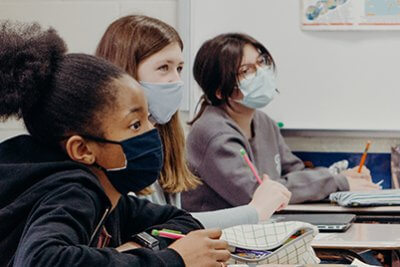April 22, 2021
 by Dr. Bill Hudson, Head of School
by Dr. Bill Hudson, Head of School
Ask my kids or my husband. Ask a member of the administrative team. Any of them will say I am wrong a lot. That probably does not inspire great confidence in your head of school. However, if you ask Adam Grant, author and professor of Psychology at the Wharton School of the University of Pennsylvania, it’s a good thing. According to Grant, keeping an open mind means reexamining our ideas and beliefs. For him, the purpose of learning isn’t to affirm our beliefs, it’s to evolve our beliefs.
These days continue to be difficult for many people. I keep asking myself when it will be that we can just “teach” and not feel the weight of social unrest, racial inequality, mass shootings, police shootings, political discord, and the pandemic. The truth is probably never, and I don’t think that is being pessimistic. Throughout history, educators have been called upon to walk with their students, helping them make sense of the world. As a school that teaches the whole-child, we cannot shut the doors and ignore the outside world or limit learning to only what happens in the classroom.
As a progressive, independent school, we are dedicated to the physical, intellectual, emotional, and ethical growth and development of our students. At MPA, we help students find deeper meaning and significance while making connections across multiple and seemingly disparate areas. In order to “learn how, not what, to think”, we help students become aware of their beliefs and ideas, teaching them to challenge assumptions, encouraging them to be open to interpretations and possibilities, and challenging them to be continually refining and amending their thinking.
In his book “The Righteous Mind: Why Good People Are Divided by Politics and Religion,” social psychologist Jonathan Haidt noted that most people, when confronted with a moral question of some kind, “will first respond emotionally and then construct a rationale to justify their initial response. We must get to at least our third thought, which has been informed by listening carefully to the perspectives of others and reflecting deeply on our own beliefs, to generate wisdom.”
I have a post-it note on my computer screen with a quote from Adam Grant: “Find something you are wrong about every day.” It is my attempt to develop a mindset of what Grant calls “confident humility” which he defines as “having faith in our capacity while appreciating that we may not have the right solution or even be addressing the right problem.” For Grant, “Saying ‘I was wrong’ isn’t an admission of incompetence. It’s a sign that you have the humility to recognize your mistakes and the integrity to learn from them. The faster you acknowledge when you’re wrong, the faster you can move toward being right.”
Addressing current events, holding courageous conversations, and making connections and weaving together information from across different subject areas is creating knowledge. Engaging in conversations to understand the perspectives of others and having the humility to challenge our assumptions is how we will make sense of a world that is constantly changing. And being willing to change our mind and heart is how we will create a just and peaceful world. That is what “Dream Big. Do Right.” is all about.